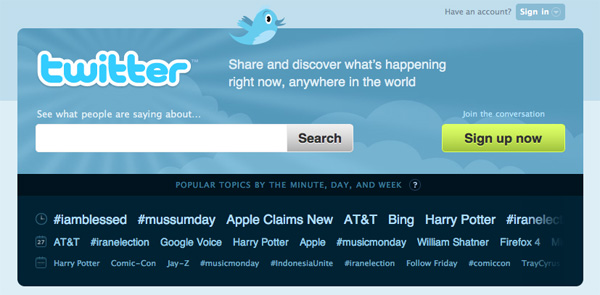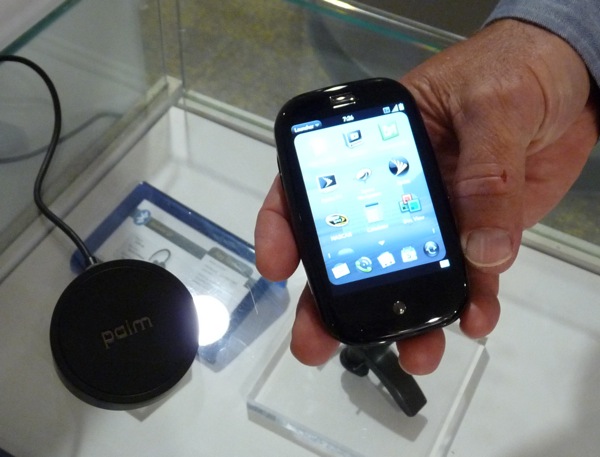
Yahoo piggybacks on Twitter for updated Delicious
Yahoo's social bookmarking service Delicious today has received an upgrade with a Twitter mashup component originally designed for Yahoo News.
TweetNews took Yahoo News articles (which are ordered chronologically) and compared them to Twitter's trending topics (which are based on a subject's popularity.) The result was a news search that could not only determine the freshest articles, but also those based on the most popular subject at the moment. The app also used social commentary to determine the pertinence of authoritative news sources when determining search results.

Bing's search gains could be sunk by Yahoo's losses
For the second straight month since its rebranding from Windows Live Search, Microsoft's Bing service has gained usage share in the US, according to private analytics firm StatCounter. And the trend for Bing is growing, picking up another 1.18% of US Internet user searches during the month of July, to 9.41%. That's after gaining just 0.42% for the month of June.
Here's the problem: While part of that gain came at Google's expense, the other part came from Yahoo, whose searches are soon to be served by Bing under the terms of last week's deal. Although Yahoo's US search share was nearly flat -- down by only 0.09% -- it's continuing its downward trend, losing about 3% of US searches since the beginning of the year. That's about one-fifth of its search audience.

Firefox hits 1 billion downloads!
Firefox total downloads: millions
Firefox has hit its milestone billionth download of all time. To celebrate the occasion, Mozilla will be launching onebillionplusyou.com on Monday, a hub for information about the achievement, and a place for Firefox users to show their love for the browser by uploading pictures of themselves representing Firefox across the globe (though they'll have a tough time beating this guy.)

VoloMedia claims it holds patent on podcasting, drawing howls of protest
A California company has announced that it has been awarded a patent for a "Method for Providing Episodic Media" on Tuesday. US Patent 7.568,213 was described by the firm as a "patent for podcasting," but company founder Murgesh Navar says the scope is actually broader than that.
Podcasting is generally thought of as RSS-based -- sign up and the episodes flow to your reader of choice. The patent doesn't specify RSS delivery, meaning that in theory other methods would fall under its purview.

Facebook feeds faceplant in third-party status tsunami
An apparent glitch in Facebook's settings has taken to pulling in updates from users' other services -- FriendFeed, Twitter, Mafia Wars and perhaps others -- whether or not it has been authorized to do so. Only uninstalling the relevant Facebook applications seems to quell the flood.
Aghast users were reporting late Wednesday that feeds from multiple services were appearing on their Facebook walls no matter what the current privacy settings might be. It's a potential privacy nightmare for users such as Kyle Sellers, who commented on a message board that "I specifically keep my accounts separate so I don't overwhelm my family with my political rantings. I have never been so furious with a web service before. I understand a service failing, but this seems both sinister and dishonest."

Microsoft and Yahoo search deal: Here's what you need to know
With the deal signed and ink drying, you may be wondering about the details behind the historic Microsoft and Yahoo search agreement, which may finally begin to put some pressure on Google's dominance in search. We break it down for you.
The Basics

Twitter's evolution starts with a new homepage
In Twitter's efforts to make the microblogging service more welcoming to first-time users, a new homepage has been unveiled which focuses on search and trending topics.
"We have a lot of work to do when it comes to the quality of our search results and trend analysis but repositioning the product to focus more on discovery is an important first step in presenting Twitter to a wider audience of folks around the world who are eager to start engaging with new people, ideas, opinions, events, and sources of information," Co-founder Biz Stone said in the site's blog.

Microsoft and Yahoo have sealed the deal
UPDATE: Microsoft and Yahoo issued joint statements this morning announcing their search partnership. As expected, Bing will power Yahoo's search and Yahoo will deal with sales, advertisement and "providing consumers with great experiences with the world's favorite online destinations and Web products."
Microsoft CEO Steve Ballmer said, "This agreement with Yahoo! will provide the scale we need to deliver even more rapid advances in relevancy and usefulness. Microsoft and Yahoo! know there's so much more that search could be. This agreement gives us the scale and resources to create the future of search."

Google Latitude released for the iPhone...browser
Yesterday's introduction of Google Latitude for iPhone could have been a big deal if the product being announced was actually an application. Instead, Google's social Geolocation product is a Web app that must be run from inside Safari. As such, it's being described as toothless, crippled and worthless by reviewers all over the Web today.
Why was it released as a Web app when it has been available as a standalone app on all the major mobile platforms for five months? Google has been quite upfront about that, saying, "We worked closely with Apple to bring Latitude to the iPhone in a way Apple thought would be best for iPhone users. After we developed a Latitude application for the iPhone, Apple requested we release Latitude as a Web application in order to avoid confusion with Maps on the iPhone, which uses Google to serve maps tiles."

Mozilla: We'll keep pushing for Ogg Theora in HTML 5
The software maker with the ability to rectify everything for the open source community in the field of free video is Google. Right now, its YouTube division relies upon Flash video, whose codecs require Web browsers including Google's own Chrome to have plug-ins installed. If YouTube merely had the option of supporting an open source standard such as Ogg Theora -- a standard supported by sites including France-based DailyMotion -- in one fell swoop, the balance might shift in favor of Ogg's being adopted, as was originally planned, as the basic codec for HTML 5's <VIDEO> element.
But that project was suspended late last month by HTML 5's principal caretakers, who perceived a stalemate between the proprietors of online videos including Google, the manufacturers of Web browsers who are also interested in maintaining high performance levels, and the rights holders to the various technologies that still underlie modern video codecs. Now Mozilla, whose Firefox 3.5 is the biggest browser so far to include built-in HTML video support, says in a statement to Betanews last night that it will press on with its support of Ogg Theora despite the setback, perhaps in hopes that online video services may come to adopt the codec as a de facto standard.

Palm Pre gets iTunes sync again
Only nine days ago, Palm Inc.'s flagship touchphone, the Pre, lost its unofficial compatibility with iTunes when Apple updated the media management software to fix "an issue with Verification of Apple devices." After users updated the software, and plugged in their Pres, they found the software no longer recognized the device for syncing.
Already, an over-the-air WebOS update (v1.1) has been made available which renews the device's ability to be paired with iTunes. The update includes new feature support in Exchange ActiveSync, the ability to include emoticons in e-mail, MMS, and SMS, and the new NFL Mobile Live app from Sprint. As an additional jab at Apple, when Palm's Vice President of Business Products, John Traynor announced the update in the company's blog yesterday, he listed all of these features, but saved the iTunes fix for last, and prefaced it by delivering Steve Jobs' now trademark line: "Oh, and one more thing..."

Live long, Prosper...and crunch those numbers
This episode of Recovery is brought to you -- literally -- by the free Wi-Fi at the Sacramento Amtrak station. Isn't it funny how the train station can offer it but most airports don't. Funny. Ha.
I spent some time this week bopping around Prosper, the peer-to-peer lending site. I'd signed up with them several years back, intending to test the system for a write-up at Another Publication. I liked what I saw so much so that I stuck with it until economic events last year caused the service to go temporarily dormant. They're back now and I thought I'd see how my people were doing.

Twitter extends a hand to clueless potential users
Afternoon of July 23, 2009 • David Letterman's comments about Twitter being "a waste of time" earlier this week gave fans of the service a good laugh, but the 62-year old chat show host who doesn't "know anything about the Twitter" actually posed a sound question. When posting a message, where does it go?
This kind of question probably wouldn't even occur to a regular user of the service, but to those unfamiliar with feeds, status updates, live blogging, and the like, Twitter offers very little to grab onto. Getting started is not as easy as it could be.

What's Now: Apple covers up its 'FirePod' problem, backs off its Bluwiki threats
Apple flambé? Exploding iPod reports hushed up
July 23, 2009 • They got that boom boom OW! -- After years of trouble and seven months of investigation, a report by KIRO-TV reporter Amy Clancy unearthed an 800-page Consumer Product Safety Commission report detailing a disturbing number of iPods that overheated and either burst into flames or started smoking.

Stalemate for Web standards continues with no open video for HTML 5
The dream of a completely free platform for online video has run up against a significant roadblock, and it's another drama that Microsoft appears happy to watch play out from the sidelines. That dream is that Web developers can embed video into their sites using the <VIDEO> element of HTML 5, without being encumbered by anyone's proprietary technology. If it works, those sites can be assured of being able to stream to browsers' native codecs, rather than requiring users to install usually proprietary plug-ins like Adobe Flash or Apple QuickTime.
The problem with online video is that the technology behind it -- encoding, decoding, streaming and distribution -- is typically owned by somebody. That means it can't freely be distributed in an open source package. The exception here is Ogg Theora, the leading open source codec, and the hope of the community for a royalty- and penalty-free Web video platform. Yet its underlying technology may not only be outmoded, some are arguing, but may also actually still be owned by someone who has yet to assert patent rights.
